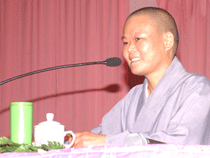
| News
Report |
|||||
| Seminar
on |
|||||
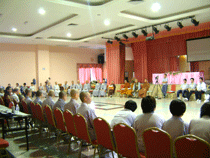 discussion session |
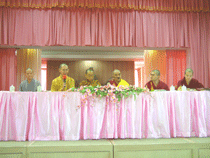 forum |
||||
| The Education Section of The Malaysian Buddhists & Sangha Association organized a seminar on ‘Living and Dying’ from 20th to 25th October at Than Hsiang Temple. The seminar was well received by both the sangha and lay followers. The participants either bhikkhu, bhikkhuni, upasaka or upasika, get an opportunity to explore and understand and become acquainted with the various views and approaches to death and living from not only the religious but social and psychological aspects. |
|||||
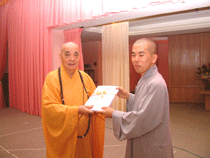 graduation |
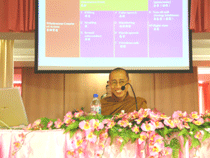 Ven Agacitta |
||||
| This
seminar is particularly relevant as dying is an inevitable process
of life. Most people especially the Chinese are scared to face ‘death’.
This is due to the traditionally ignorant thinking of the Chinese
making it a taboo to discuss death.. The word ‘death’ is especially
frightening. Though we know that dying is a natural phenomenon,
we often avoid talking about it. By doing so, we think we would
live peacefully and avoid any catastrophes. However, even though
we don’t talk about death, death occurs frequently and can be seen
everywhere. This serves as a constant reminder that death is a natural
phenomenon that none can avoid.
This seminar will help the participants develop a framework for dealing with questions about death. Having a religiously grounded understanding of end-of-life issues can be a process that will help us live well for how can one know how to live without knowing how to die. Life and death must be viewed and explained together. Only then can we understand life thoroughly and be able to establish our directions and perspectives of the world and life with wisdom. It is rare to see seminars using ‘Living and Dying’ as the main topic in the Chinese society. As such, we owe our gratitude to The Malaysian Buddhists & Sangha Association as well as the chief abbot of Than Hsiang, Ven. Wei Wu, for these special conditions. The six-day seminar will address practices around the time of death and rituals for the three traditions namely the Mahayana, Theravada and Vajrayana. This seminar sheds light that although their paths are different they all lead to the same destination. This stimulated the participants to cast aside their prejudice and embrace the thinking of the various Buddhist schools and sects. In
this seminar the topics include : <Where to go – Kamma, death,
rebirth>, 《中阴转世》、<The cause and effect of life and death from
the perspective of Mind Only>, <The management of near-death
and death from the view points of western psychology>. The above
topics were presented by Aggacitta Bikkhu, Geshe Kelsang, Ven. Hai
Chin and Mr. Prelema (培乐玛) respectively. |
|||||
|
|
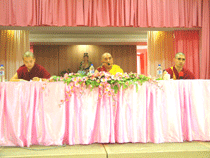 Geshe Kelsang |
||||
|
|||||
| Thank
you for reading the Than Hsiang E-zine. Unsubscribe I Subscribe I Change subscription |
|||||
